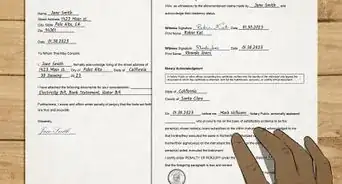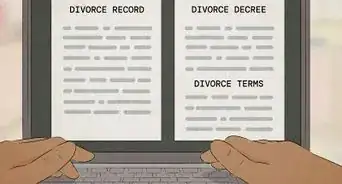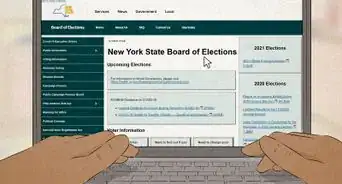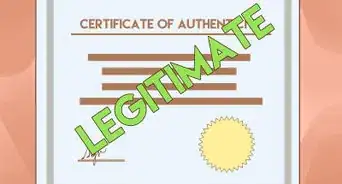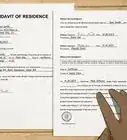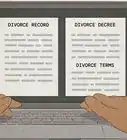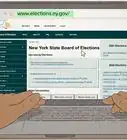This article was co-authored by Lahaina Araneta, JD. Lahaina Araneta, Esq. is an Immigration Attorney for Orange County, California with over 6 years of experience. She received her JD from Loyola Law School in 2012. In law school, she participated in the immigrant justice practicum and served as a volunteer with several nonprofit agencies.
There are 10 references cited in this article, which can be found at the bottom of the page.
This article has been viewed 56,195 times.
Wills and other probate documents are public records, so you should be able to find them with a little detective work. Typically, you’ll need the deceased person’s name, date of death, and last residence. The process for finding will records will depend on where you are searching.
Steps
Obtaining Records in the U.S.
-
1Find the deceased person’s full legal name. You’ll need to search for a will or other probate records by name. Get their first and last name, at a minimum. Also look for their middle initial or middle name. Ask people who knew the deceased if they knew their full legal name.
- Some people use nicknames. For example, “Jen” is probably short for “Jennifer” and “John” is often short for “Johnathon”—but not always.
-
2Confirm the date of death. This is easy if you knew the person. If you aren’t 100% sure, you can look through newspapers and try to find a death notice. Other people may need to search the Social Security Death Index.[1]
- The Death Index provides information for those who died after 1936 and who had a Social Security number.
- You can search the death index for free at different genealogy websites. Some will charge you money, so look around to find a free option.
Advertisement -
3Determine the last place of residence. Probate records are kept in different courts around the country. There is no one central repository, so you need to find out the county where the deceased last resided. You can find this information from the Social Security Death Index.
- Keep in mind that county lines are often redrawn.
-
4Find the probate index for the records you want. The index is the archive that holds the records. Do an Internet search to find the website for the archive. Many sites include holdings information, telephone numbers, and even addresses and directions to the probate court. Some sites may even allow you to view the records online.[2]
-
5Visit the probate court if you can’t find the records online. Once you have the probate index, you should contact the probate court in that county. Probate records are public records, but each court might have a slightly different process for obtaining access. Provide the clerk with the probate index and the deceased’s name so they can find the file.[3]
-
6Find the will or other document. The will should be near the front of the file, since the executor started the probate process by filing the will with the court. Other records may be scattered throughout the file, so go through it carefully to find what you need.[4]
-
7Check if you can make copies. There might be a coin-operated photocopier in the clerk’s office. Ask if you can make copies and how. You may need to use your smart phone to take pictures of the pages.
- Don’t try to walk out of the courthouse with the case file.
Finding Will Records in England and Wales
-
1Identify the deceased. You’ll search for wills by last name and the year of death.[5] If you don’t know the year, look in newspapers or ask people who knew the deceased. As a last resort, you can guess different years of death.
-
2Search the website. Visit https://www.gov.uk/search-will-probate and click on the green “Start Now” button. There are three databases, so select the one that applies:
- Records from 1858 to 1996
- Records from 1996 and after
- Soldier’s wills
-
3Pay to order. You can pay with credit or debit card. It costs £10 for each record. After you order, it will take up to 10 working days for you to receive the requested records.[6]
-
4Submit an order through the post instead. You’ll need to download Form PA1S, which you can get at http://formfinder.hmctsformfinder.justice.gov.uk/pa1s-eng.pdf. Complete the form and submit £10. Each additional copy costs £0.50. Pay with a cheque, postal order, or international money order. Write the name of the deceased person on the back of your payment.
- Submit the form and payment to the address provided on the form.
Obtaining a Will in Australia
-
1Find required information. You can get a copy of a will if you have the deceased person’s name, year of death, and the state or territory where they died. Try to collect other helpful information, such as their last known address.
-
2Contact the relevant Supreme Court. Look on the website for the state or territory where the person died. There is no central Australian repository for this information. Instead, each state or territory maintains its own records.
- The court might not have a will. For example, the Supreme Court of Queensland only has wills if the deceased person’s executor filed for a grant of probate.[7]
-
3Submit your request. Each court has different methods of submitting a request.
- In Western Australia, by contrast, you can request a copy by completing a Search Enquiry Form or by emailing your request to supremecourt.probate@justice.wa.gov.au.
- Wills won’t be publicly available until probate has been granted. This process can take months, so a will might not be immediately available if the person only recently died.[8]
-
4Make a request in person instead. You might also stop into the Probate Registry of the Supreme Court to make a request.[9] If you need a copy of the will quickly, this might be your best option.
-
5Pay your fee. Check with the Supreme Court to find out the current fee schedule and acceptable methods of payment. In Western Australia, for example, you will need to pay $1.70 per page.[10]
- If you make a request online, you can include your credit or debit card details in the email.
Finding a Will in Canada
-
1Find out where the person died. You’ll need to search for a will by contacting the Superior Court of Justice where the personal representative filed the will. For this reason, you need to find the county or district where the deceased last lived.[11]
- Ask around if you don’t know where the person lived. You can also search online or for death announcements in newspapers.
-
2Contact the appropriate office. The office you contact will depend on the province or territory that has the record. For example, in Alberta, you will need to contact the Surrogate office of the Judicial Centre where probate was opened.[12]
- If you don’t know what office to contact, then call your local court and ask. They can direct you to the appropriate office.
-
3Pay a fee. You might need to pay a search fee. In Alberta, for example, you must pay a $10.00 search fee per name. Viewing the file is included in the fee, but you’ll have to pay more if you want to photocopy the will.[13]
References
- ↑ http://info.legalzoom.com/last-records-4628.html
- ↑ http://dohistory.org/on_your_own/toolkit/probateRecords.html
- ↑ http://info.legalzoom.com/last-records-4628.html
- ↑ http://info.legalzoom.com/last-records-4628.html
- ↑ https://probatesearch.service.gov.uk/#wills
- ↑ https://www.gov.uk/search-will-probate
- ↑ http://www.courts.qld.gov.au/services/wills-and-probate/searches-for-wills-and-probate
- ↑ http://www.lawhandbook.sa.gov.au/ch36s01s07.php
- ↑ http://www.lawhandbook.sa.gov.au/ch36s01s07.php
- ↑ http://www.supremecourt.wa.gov.au/P/probate_fees.aspx?uid=2204-6428-3676-6753
- ↑ https://www.attorneygeneral.jus.gov.on.ca/english/estates/estates-FAQ.php#s1
- ↑ https://albertacourts.ca/court-of-queens-bench/frequently-asked-questions
- ↑ https://albertacourts.ca/court-of-queens-bench/frequently-asked-questions

















